大学英语选修课的必要性和意义
- 格式:pdf
- 大小:22.48 KB
- 文档页数:2
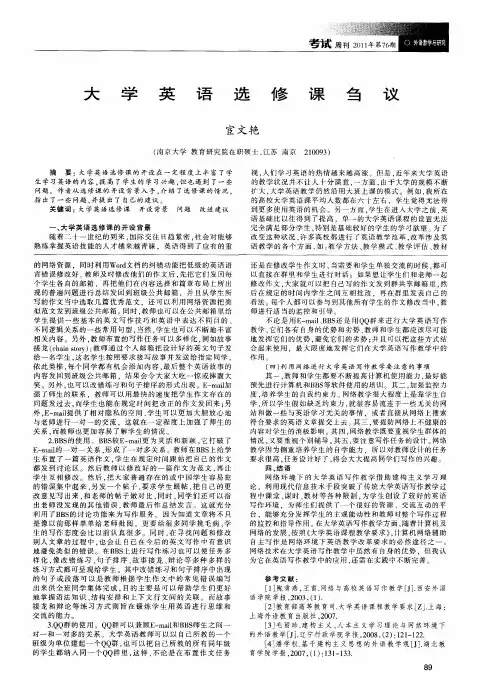

大学英语选修课情况介绍1.选修课程名称:大学英语2. 课程性质:本课程是各专业的基础课程,本课程的任务是使学生掌握英语日常会话、科技英语阅读、科技英语翻译及英语应用问写作的基本理论和基本技能,掌握大约2,600个常用英语单词和词组,能够借助词典阅读和翻译与专业相关的简单英语资料,并具有一定的涉外交际能力,以满足学生在今后工作中的需要。
3. 授课目标及课程任务要求:本大纲参照教育部颁布的《高职高专英语教学的基本要求》(2000),并根据我院的实际教学需要,要求在约144个课时内完成对《新编实用英语综合教程》前二册的主要内容的教学,并在教学实践的过程中帮助学生拓宽英语知识面,是学生在英语的听、说、读、写、译等能力上有所提高,让学生通过三个学期的学习掌握一定的英语词汇量,能通过国家“英语应用能力考试(B级)”,能借助词典阅读和翻译有关的英语资料,并能在涉外交际的日常活动和业务活动中能进行简单的口头和书面交流的目的。
具体内容如下:(1)词汇方面认识2400个英语单词(包括入学时已掌握的1000个单词)以及由这些词构成的常用词组,对其中1500个左右的单词能正确的平写,能进行英汉互译。
(2)语法方面掌握英语的基本语句结构了解非谓语动词的用法,虚拟语气的格式,独立结构的格式和意义、状语匆遽及定语从局的结构形式等,并能在听说读写译的实践中正确使用所说语法知识。
(3)听力能力了解英语听力的基本技巧,能听懂日常和涉外业务活动中使用的结构简单、发音清晰、语速较慢(每分钟100词左右)的英语对话和不太复杂的对白,理解基本准确。
(4)口语能力了解口语交流的常用规则,能用英语进行简单的课堂交际,并能在日常和涉外业务活动中进行简单的交流。
(5)阅读能力了解英语阅读的基本技巧,并能基本运用这些技巧阅读中等难度的一般题材的简短英文资料。
在阅读生词不超过3%的英文资料时,阅读速度不低与每分钟70词,并理解正确。
能读懂通用的简短的实用性文字材料,如信笺、技术说明、告示、合同书等,理解正确。
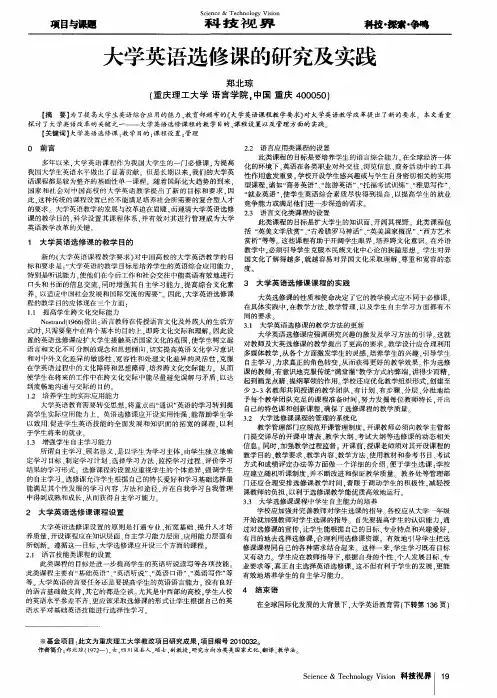
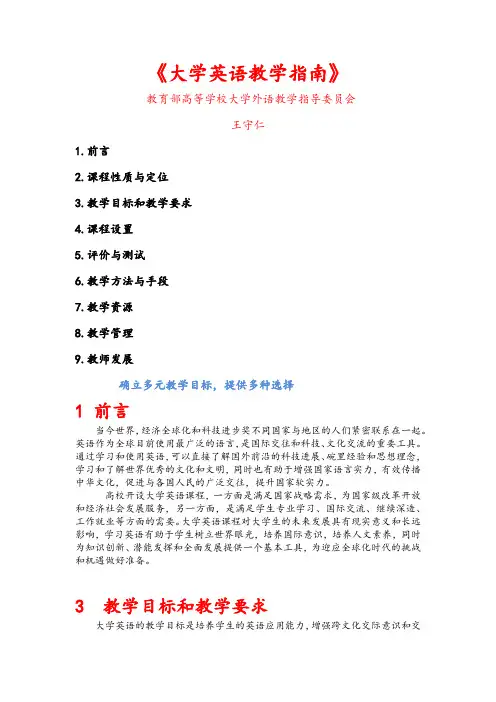
《大学英语教学指南》教育部高等学校大学外语教学指导委员会王守仁1.前言2.课程性质与定位3.教学目标和教学要求4.课程设置5.评价与测试6.教学方法与手段7.教学资源8.教学管理9.教师发展确立多元教学目标,提供多种选择1 前言当今世界,经济全球化和科技进步奖不同国家与地区的人们紧密联系在一起。
英语作为全球目前使用最广泛的语言,是国际交往和科技、文化交流的重要工具。
通过学习和使用英语,可以直接了解国外前沿的科技进展、碗里经验和思想理念,学习和了解世界优秀的文化和文明,同时也有助于增强国家语言实力,有效传播中华文化,促进与各国人民的广泛交往,提升国家软实力。
高校开设大学英语课程,一方面是满足国家战略需求,为国家级改革开放和经济社会发展服务,另一方面,是满足学生专业学习、国际交流、继续深造、工作就业等方面的需要。
大学英语课程对大学生的未来发展具有现实意义和长远影响,学习英语有助于学生树立世界眼光,培养国际意识,培养人文素养,同时为知识创新、潜能发挥和全面发展提供一个基本工具,为迎应全球化时代的挑战和机遇做好准备。
3教学目标和教学要求大学英语的教学目标是培养学生的英语应用能力,增强跨文化交际意识和交际能力,同时发展自主学习能力,提高综合文化素养,是他们在学习、生活、社会交往和未来工作中能够有效地使用英语,满足国家、社会、学校和个人发展的需要。
基础目标提高目标发展目标大学英语根据三级教学目标目标提出三个级别的教学要求。
基础目标的教学要求主要针对英语高考成绩合格的学生,是大部分学生本科毕业时应达到的基本要求。
提高目标和发展目标的教学要求分别针对大学入学时应予以达到较好水平的学生,也是对学生英语应用能力要求较高的专业所选择的要求。
对英语高考成绩基本合格的学生学校可适当调整基础目标的部分教学要求。
基础目标能够基本满足日常生活、学习和未来工作中与自身密切相关的信息交流的需要;能够基本正确地运用英语语言、智慧、语法及篇章结构等语言知识,在高中阶段应掌握的词汇基础上增加约2000个单词,其中四百个单词为与专业学习与未来工作相关的词汇;能够基本理解语言难度中等、设计常见的个人和社会交流题材的口头或书面材料;能够就熟悉的主题或话题进行简单的口头和书面交流;能够借助网络资源、工具书或他人的帮助,对中等语言难度的信息进行处理和加工,理解主旨思想和重要细节,表达基本打一份好能够使用有限的学习策略;在与来自不同文化的人交流时,能够观察到彼此之间的文化和价值观差异,并能根据交际需求运用有限的交际策略。
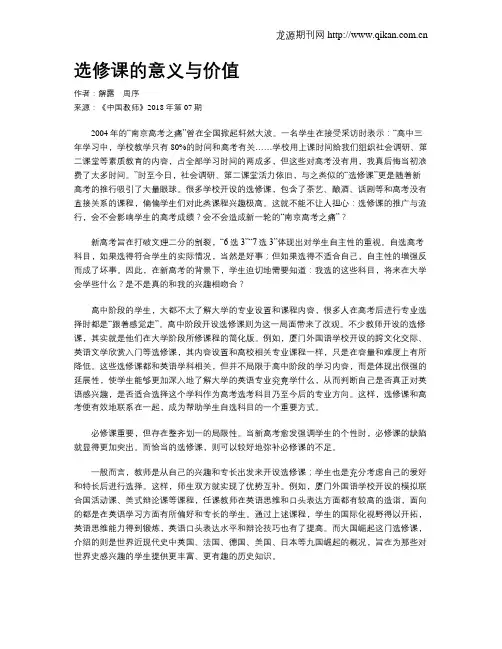
选修课的意义与价值作者:解露周序来源:《中国教师》2018年第07期2004年的“南京高考之痛”曾在全国掀起轩然大波。
一名学生在接受采访时表示:“高中三年学习中,学校教学只有80%的时间和高考有关……学校用上课时间给我们组织社会调研、第二课堂等素质教育的内容,占全部学习时间的两成多,但这些对高考没有用,我真后悔当初浪费了太多时间。
”时至今日,社会调研、第二课堂活力依旧,与之类似的“选修课”更是随着新高考的推行吸引了大量眼球。
很多学校开设的选修课,包含了茶艺、酿酒、话剧等和高考没有直接关系的课程,偏偏学生们对此类课程兴趣极高。
这就不能不让人担心:选修课的推广与流行,会不会影响学生的高考成绩?会不会造成新一轮的“南京高考之痛”?新高考旨在打破文理二分的割裂,“6选3”“7选3”体现出对学生自主性的重视。
自选高考科目,如果选得符合学生的实际情况,当然是好事;但如果选得不适合自己,自主性的增强反而成了坏事。
因此,在新高考的背景下,学生迫切地需要知道:我选的这些科目,将来在大学会学些什么?是不是真的和我的兴趣相吻合?高中阶段的学生,大都不太了解大学的专业设置和课程内容,很多人在高考后进行专业选择时都是“跟着感觉走”。
高中阶段开设选修课则为这一局面带来了改观。
不少教师开设的选修课,其实就是他们在大学阶段所修课程的简化版。
例如,厦门外国语学校开设的跨文化交际、英语文学欣赏入门等选修课,其内容设置和高校相关专业课程一样,只是在容量和难度上有所降低。
这些选修课都和英语学科相关,但并不局限于高中阶段的学习内容,而是体现出很强的延展性,使学生能够更加深入地了解大学的英语专业究竟学什么,从而判断自己是否真正对英语感兴趣,是否适合选择这个学科作为高考选考科目乃至今后的专业方向。
这样,选修课和高考便有效地联系在一起,成为帮助学生自选科目的一个重要方式。
必修课重要,但存在整齐划一的局限性。
当新高考愈发强调学生的个性时,必修课的缺陷就显得更加突出。
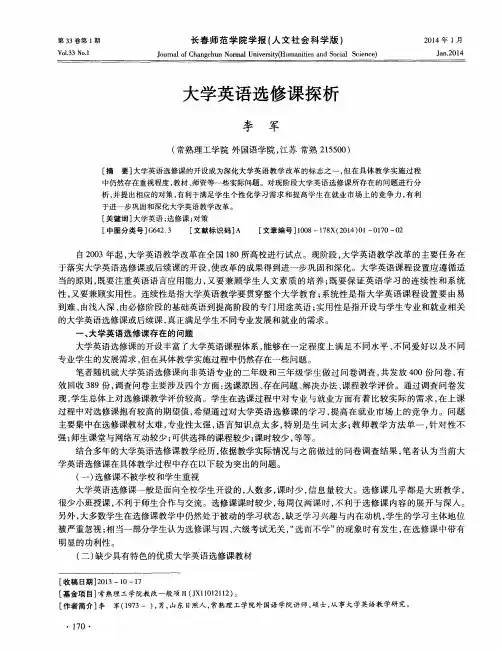
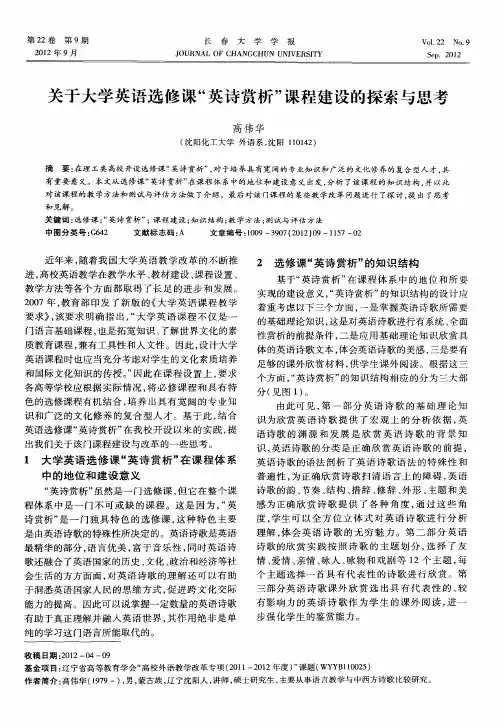

Thanks for you, my friend. Y ou really speak very good English and I fully understand your opinion. But I truly have such a doubt that if English were a selective course, you could have no opportunity to stand here and we talked about this topic totally in English, because our English may be so poor that we dare not say even a simple English word. Y es that’s a bit of exaggeration. But I insist that English should be a compulsory course. From the social opinion,English has become an international language in the world. Many countries are treating English as an official language even in some countries where they have their own native language such as India. The official language of 45 countries is English and nearly one third of the world’s population which means 21 hundreds of millions speak English. Almost three quarters of the TV programs are English and when you begin to work you may have to deal with many English emails because 75 percent of them are written in English. And apparently, a keyboard is also an English keyboard. Since China’s accession to WTO,the impact of globalization on China is increasing. We are facing a lot of international economy issue and we have to better communicate with some foreign businessmen and tourists. Learning English in fact is to learn something more advanced in western countries. Suppose you are doing a research and you have to look for some information. If you have a good ability in English you can just look for the information in some foreign magazines or some English websites. After all, the articles especially in science are always written in English.For us students,first coming is the requirement from the society. If English were changed into a selective course, students would spend less time on it, so they cannot study English that well. In the long run, when you are graduated and looking for a job, the boss will see whether you have passed the CET4 even the CET6 and if not you will have to accept a sorry. Besides learning a language is not that easy. Treating English as a compulsory is a must! By learning English well you can broaden your horizon especially in this information age when English is attached so much importance to. Also a good English ability makes you more advantage than somebody else.All I have stated above can tell the importance to set English a compulsory course.I am not denying there are some students who may have difficulties in learning English and show less interest in English. But if you can insist on it, you can benefit more thanimagination! College is the very time you can greatly improve your English ability. That’s why the government set English a compulsory course in college.。
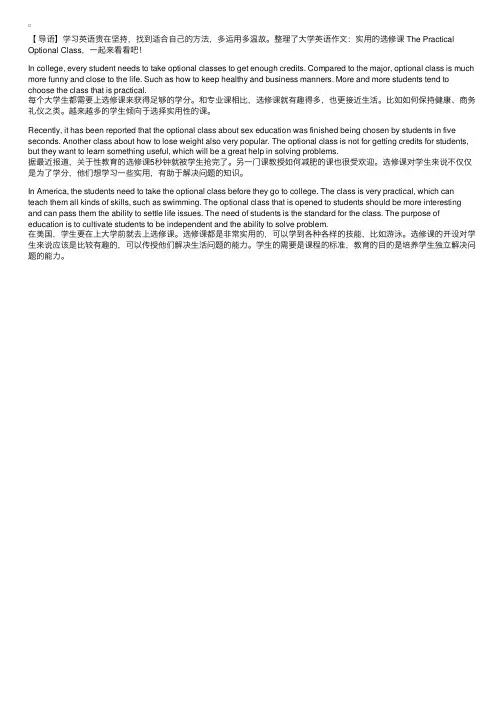
【导语】学习英语贵在坚持,找到适合⾃⼰的⽅法,多运⽤多温故。
整理了⼤学英语作⽂:实⽤的选修课 The Practical Optional Class,⼀起来看看吧!In college, every student needs to take optional classes to get enough credits. Compared to the major, optional class is much more funny and close to the life. Such as how to keep healthy and business manners. More and more students tend to choose the class that is practical.每个⼤学⽣都需要上选修课来获得⾜够的学分。
和专业课相⽐,选修课就有趣得多,也更接近⽣活。
⽐如如何保持健康、商务礼仪之类。
越来越多的学⽣倾向于选择实⽤性的课。
Recently, it has been reported that the optional class about sex education was finished being chosen by students in five seconds. Another class about how to lose weight also very popular. The optional class is not for getting credits for students, but they want to learn something useful, which will be a great help in solving problems.据最近报道,关于性教育的选修课5秒钟就被学⽣抢完了。
另⼀门课教授如何减肥的课也很受欢迎。
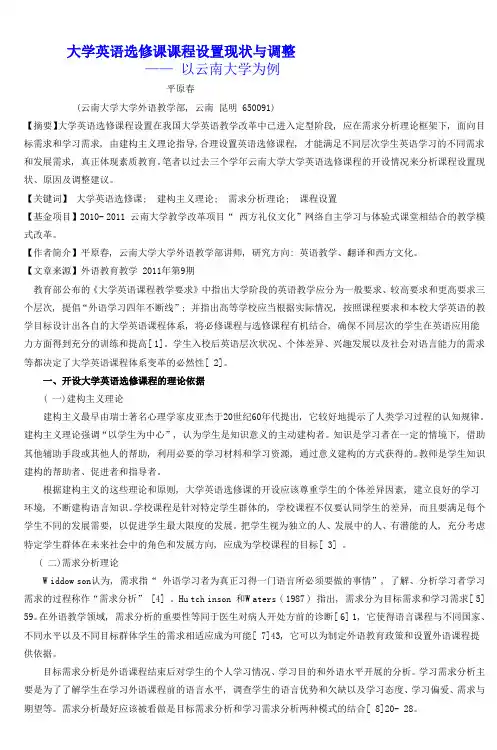
大学英语选修课课程设置现状与调整——以云南大学为例平原春(云南大学大学外语教学部, 云南昆明 650091)【摘要】大学英语选修课程设置在我国大学英语教学改革中已进入定型阶段, 应在需求分析理论框架下, 面向目标需求和学习需求, 由建构主义理论指导,合理设置英语选修课程, 才能满足不同层次学生英语学习的不同需求和发展需求, 真正体现素质教育。
笔者以过去三个学年云南大学大学英语选修课程的开设情况来分析课程设置现状、原因及调整建议。
【关键词】大学英语选修课; 建构主义理论; 需求分析理论; 课程设置【基金项目】2010- 2011 云南大学教学改革项目“西方礼仪文化”网络自主学习与体验式课堂相结合的教学模式改革。
【作者简介】平原春, 云南大学大学外语教学部讲师, 研究方向: 英语教学、翻译和西方文化。
【文章来源】外语教育教学 2011年第9期教育部公布的《大学英语课程教学要求》中指出大学阶段的英语教学应分为一般要求、较高要求和更高要求三个层次, 提倡“外语学习四年不断线”; 并指出高等学校应当根据实际情况, 按照课程要求和本校大学英语的教学目标设计出各自的大学英语课程体系, 将必修课程与选修课程有机结合, 确保不同层次的学生在英语应用能力方面得到充分的训练和提高[ 1]。
学生入校后英语层次状况、个体差异、兴趣发展以及社会对语言能力的需求等都决定了大学英语课程体系变革的必然性[ 2]。
一、开设大学英语选修课程的理论依据( 一)建构主义理论建构主义最早由瑞士著名心理学家皮亚杰于20世纪60年代提出, 它较好地提示了人类学习过程的认知规律。
建构主义理论强调“以学生为中心”, 认为学生是知识意义的主动建构者。
知识是学习者在一定的情境下, 借助其他辅助手段或其他人的帮助, 利用必要的学习材料和学习资源, 通过意义建构的方式获得的。
教师是学生知识建构的帮助者、促进者和指导者。
根据建构主义的这些理论和原则, 大学英语选修课的开设应该尊重学生的个体差异因素, 建立良好的学习环境, 不断建构语言知识。
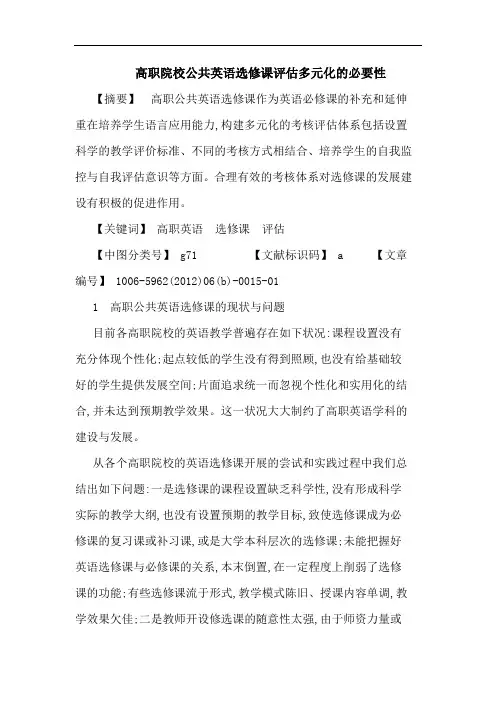
高职院校公共英语选修课评估多元化的必要性【摘要】高职公共英语选修课作为英语必修课的补充和延伸重在培养学生语言应用能力,构建多元化的考核评估体系包括设置科学的教学评价标准、不同的考核方式相结合、培养学生的自我监控与自我评估意识等方面。
合理有效的考核体系对选修课的发展建设有积极的促进作用。
【关键词】高职英语选修课评估【中图分类号】 g71 【文献标识码】 a 【文章编号】 1006-5962(2012)06(b)-0015-011 高职公共英语选修课的现状与问题目前各高职院校的英语教学普遍存在如下状况:课程设置没有充分体现个性化;起点较低的学生没有得到照顾,也没有给基础较好的学生提供发展空间;片面追求统一而忽视个性化和实用化的结合,并未达到预期教学效果。
这一状况大大制约了高职英语学科的建设与发展。
从各个高职院校的英语选修课开展的尝试和实践过程中我们总结出如下问题:一是选修课的课程设置缺乏科学性,没有形成科学实际的教学大纲,也没有设置预期的教学目标,致使选修课成为必修课的复习课或补习课,或是大学本科层次的选修课;未能把握好英语选修课与必修课的关系,本末倒置,在一定程度上削弱了选修课的功能;有些选修课流于形式,教学模式陈旧、授课内容单调,教学效果欠佳;二是教师开设修选课的随意性太强,由于师资力量或教学资源有限,有些选修课的开设缺乏调研和论证,大都由教师根据自己的喜好选定,随意开课,脱离了实际情况,从而导致了英语选修课的教学质量不容乐观;三是学生在自由选择选修课时,盲目性过大,缺乏教师的建议和指导,在一定程度使学生的个人发展及人才市场的需求脱离;四是对英语选修课的考核体系不够科学,选修课考试形式比较单一,大都为开卷随堂考试,致使许多学生和老师对选修课都不够重视,出现了学生为挣学分,老师为挣课时的局面。
2 构建高职公共英语选修课多元化的评估体系2.1 高职公共英语选修课程的教学评价标准高职公共英语选修课是英语基础教学的补充与拓展,选修课能有效补充高职英语基础教学,完善高职英语教学体系,并优化教学内容和资源配置,同时给予学生较大的选择空间,使学生最大程度地受益。
《科技英语翻译》作为公选课开设的必要性 本文为陕西省教育厅科研计划资助项目(编号:11jk0400)研究成果 【摘要】在大学开设《科技英语翻译》公共选修课,既能促进学生学习与基础英语的衔接,提高语言交际和使用能力,又能促进专业课的教学,提高学生的翻译能力。 【关键词】科技英语翻译;公选课;开设;必要性 一、引言 目前,随着学生英语水平的普遍提高及社会发展的需求,大学英语基础教学已不能全面提升学生的实际运用能力,大学英语教学开始有向专业英语教学倾斜的趋势。谈到专业英语不可避免地要提到专用英语(esp)。esp是由于实际对专业知识面的需要而从普通英语(general english, ge)中分离出的一个语言分支,即考虑了学生的实际工作需要。根据不同的专业内容,esp又分为商业经济英语(english for business and economics, ebe)、社会学英语(english for social science, ess)、科技英语( english for science and technology, est)三大分支,根据这种分类方法,理工科大学英语前两年的教学属ge,而专业阅读阶段则为est。西安科技大学属以理工科为主体的院校,在全校开设科技英语相关课程的公选课是学生所需求的,本文则谈谈开设科技英语翻译公选课的必要性。 二、科技英语翻译教学 科技英语翻译教学不同于科技英语阅读,阅读要求掌握丰富的专业词汇和较高的阅读理解力,也不同于科技英语语法,语法重在学生夯实对句子结构的理解与分析,也不同于科技英语写作,写作是学生运用所学专业知识对主题的描述与说明等,科技英语翻译教学是从词、短语、分句、长句到篇章逐渐递升的分析与理解的一项实践活动,它会强调学生对基础知识的掌握与实际运用能力的结合。 1、加深学生对词汇的了解 科技英语中专业词汇多,并且在普通英语中常用的词汇,学生并不知道这些单词的科普意义,专业词汇的讲解和掌握是教学的一个重点,在介绍单词时,要从基本词义推出引伸词义,这样可以让非英语专业学生从一个词“点”联想并掌握一个词“面”。 例如: 常用名词“power(能力、权力)”在以下句子的不同用法: (1)the electronic microscope possesses very high resolving power compared with the optical microscope. 与光学显微镜相比,电子显微镜具有极高的分辨率。 (2)power can be transmitted over a long distance. 电力可以输送到很远的地方。 (3)the fourth power of three is eighty-one. 3的4次方是8l。 (4)the combining power of one element in the compound must equal the combining power of the other element. 化合物中一种元素的化合价必须等于另一元素的化合价。 (5)explosive technological development after 1940 gave the medical profession enormous power to fight disease and sickness. 1940年以来,随着技术的迅速发展,医学界大大提高了战胜疾病的能力。 (6)semiconductor devices have no filament (灯丝)or heaters and therefore require no heating power or warmed up time. 半导体器件没有灯丝,因此不需要加热功率或加热时间。 (7)a car needs a great power to go fast. 汽车高速行驶需要很大的动力。 类似这样一词多义现象的词汇在科技英语中有很多,需要强调学生在阅读中学习积累、比较并且记忆,另外在科技英语翻译教学中学习单词时,还会多分析构词法、近义词、反义词,系统介绍科技英语中常用的词缀和缩略词等等,这些对学生普通英语的学习均有帮助。 2、培养学生的翻译技能 科技英语翻译教学面对的学生是有一定英语基础的二年级以上的学生,教学中发现各个专业的学生普遍存在的问题是翻译能力欠缺。表现为僵硬的直译、不尊重原文、漏译、译文冗余、不通顺等问题。而科技英语翻译是通过比较两种语言的特点、总结语言表达规律,在理解的基础上信顺地表达出来的过程。它是语法、词汇、逻辑分析、两种语言对比等综合训练,是全面提高语言水平的重要方法。通过科技英语翻译教学,学生在阅读翻译中遇到的长句和复杂句,能够结合翻译技巧和科技英语中典型的语言特点进行分析理解,学生头脑中建立的一套翻译理论及技巧,变以前的无意识的“一一对应”式的直译为有意识地运用翻译技巧的灵活翻译,对学生普通英语的掌握同样有帮助。 3、促进学生对专业知识的学习 科技英语翻译与学生的专业需要密切相关,尽量由浅入深地覆盖从专业基础课到专业应用课的典型基础知识。由于学生在学习专业课的过程中,接触最多的科技书籍、论文和仪器说明书,且在搞毕业设计时还要翻译摘要,科技英语翻译教学尽力让学生熟悉这些内容。专业知识是理解语言的基础,语言翻译又是为更好地理解专业知识,教学的目的是既掌握语言知识又要搞懂专业知识。所以对学生不熟悉的内容,老师一方面鼓励学生充分发挥自己的专业优势和英语表达能力,另一方面引导学生通过翻译对语言的理解来获得专业知识,这无疑也会促进学生对专业知识的学习,但整个科技英语翻译教学均以语言教学为主,以专业知识的学习为辅,达到语言的实际运用效果。 三、结论 通过以上的分析可以看出,科技英语翻译会促进普通英语学习和专业知识的掌握,它既是英语语言教学的继续,又兼顾专业知识的讲解,服务于专业课教学。科技英语翻译教学是以专业知识方面的英语语言为依托,在一定英语教学的基础上继续培养学生的语言技能,以使学生能以英语为工具获取专业知识信息。在缺乏专业英语老师的情况下,开设科技英语翻译这样的公共选修课,既能使学生与基础英语衔接,继续培养语言能力;又能促进专业课的教学,是一种有针对性且高效的教学模式。 【参考文献】 [1]p.c.robinson.esp (english for special purpose) oxford: pergamon press.1980. [2]魏羽.新世纪科技英汉互译教程.西安:西安工业大学出版社,2011. [3]赵起.英汉翻译学实用教程.北京:北京大学出版社,2008.
《大学英语》课程标准一、课程性质与目标大学英语是高等教育中的一门必修课程,旨在培养学生的英语综合应用能力,包括听、说、读、写、译等方面。
通过本课程的学习,学生应能够掌握一定的词汇量、语法知识和文化背景知识,能够运用英语进行交流、阅读和写作,以适应社会发展和国际交流的需要。
二、课程理念与目标设定1. 注重培养学生的英语实际应用能力,强调语言交际能力的培养,提高学生的跨文化交际意识。
2. 突出学生的主体地位,注重学生的个体差异,因材施教,为不同层次的学生提供个性化的学习方案。
3. 整合多种资源,采用多种教学模式和教学手段,激发学生的学习兴趣和积极性。
4. 注重课程内容的时代性、实用性和前瞻性,不断更新教学内容,以满足社会发展和学生需求的变化。
三、课程设置与教学内容1. 大学英语课程应包括必修和选修两个部分,必修课应涵盖听、说、读、写、译等方面的基础英语技能训练,选修课则应提供更多更广泛的英语应用技能培训,如商务英语、旅游英语、科技英语等。
2. 教学内容应注重与学生所学专业相结合,体现英语的实用性和职业性,帮助学生更好地理解和运用英语。
3. 教材选择应注重质量,内容要具有时代性、实用性和针对性,同时要考虑到不同层次学生的需求。
4. 教师应根据教学需要,合理使用现代化教育技术,如多媒体教学、网络教学等,以丰富教学手段,提高教学效果。
四、课程评价与教学质量监控1. 建立科学的课程评价体系,包括形成性评价和终结性评价两种方式,以全面评估学生的学习成果。
2. 加强对教师教学质量的监控,建立教师教学评价制度,定期进行教学检查和评估,以提高教师的教学水平和教学质量。
3. 鼓励学生参与课程评价,通过问卷调查、座谈会等方式,了解学生的学习情况和需求,以便及时调整教学内容和方法。
4. 建立教学质量反馈机制,将评价结果及时反馈给教师和管理部门,以便改进教学管理和提高教学质量。
五、师资队伍建设与教学资源保障1. 加强大学英语师资队伍建设,提高教师的专业素质和教学能力,鼓励教师参加各种培训和学习活动。
大学生应学习有用科目还是喜欢的科目英语作文1As college students, we often face a dilemma when choosing courses: should we focus on useful subjects or those we like? Well, it's really a tough question.On one hand, learning useful subjects seems to be a very practical choice. Take computer science as an example. In today's digital age, computer technology is everywhere. Almost every industry needs people who are good at it. If a student majors in computer science, he or she is more likely to find a well -paid job after graduation. For many students, getting a good job is one of the most important goals of going to college. So, choosing useful subjects can be seen as an investment in their future.On the other hand, choosing the subjects we like also has its own advantages. For instance, if a student has a strong passion for art, then studying art -related subjects will make him or her more motivated. When we study what we love, we are more likely to put in extra effort and enjoy the learning process. We might not be thinking about how much money we can make in the future, but rather the joy and satisfaction we get from learning.In my opinion, it's not easy to say which one is better. Maybe a balance is needed. We can choose some useful subjects to ensure our future career while also taking some courses that we are interested in to enrich our college life and keep our passion for learning alive.中文翻译:作为大学生,我们在选课的时候常常面临一个两难的境地:我们应该专注于有用的科目还是自己喜欢的科目呢?嗯,这确实是个棘手的问题。
大学选修课选择的影响因素英语作文全文共3篇示例,供读者参考篇1Choosing Elective Courses at University: A Big Kid's GuideHi there! My name is Jamie and I'm 8 years old. My big sister Jessica just started university last year, and she's been telling me all about the crazy number of different courses she can take. It's mind-boggling! Way more options than the few extras we get at elementary school.Jessica says that besides the required courses for her major (that's her specialized study area), she gets to pick several "elective" courses from a huge list. These are classes on all kinds of fascinating topics outside her main field of study. How does one even begin to decide?After talking to Jessica and some of her university friends, I've learned that there are quite a few important things that big kids tend to think about when selecting electives. Let me break it down for my fellow little people who may be university-bound someday!Meeting RequirementsOkay, so this one is pretty obvious but important. At Jessica's school, you need a certain number of elective credits to graduate, and there are some other specific requirements too. For example, you might have to take at least one course from a particular group like humanities, social sciences, languages, etc.So you can't just pick any random courses that look interesting. You need to make sure you'll check thoseboxed first. Jessica told me she usually starts by making a list of courses that fit the requirements she still needs to fulfill. That way she ensures she'll be able to graduate on time!Exploring InterestsWith so many cool-sounding electives out there, how's a big kid supposed to choose? One great strategy is to go with subjects you're curious about or passionate about. Are youlow-key obsessed with ancient civilizations? Maybe an archaeology or classics course would be fun. Is biology your thing? Perhaps a class on genetics or animal behavior.Lots of students use electives to explore entirely new areas outside their major field of study. That's been really exciting for Jessica, who's discovered some new interests through her electives like linguistics and environmental studies. By takingclasses in different disciplines, you get exposed to new perspectives and ways of thinking about the world.Building SkillsAnother reason to pick certain electives is to develop skills that can be really useful for your future career...or just life in general! For instance, classes on public speaking, business writing, data analysis, coding, and project management can help make you a stronger candidate for jobs after graduation.Jessica signed up for a technical writing course last semester because she figured those skills would be an asset for whatever career she ends up pursuing. From what I've heard, it was tough but super rewarding. She learned how to break down complex topics and communicate them clearly and effectively. Nifty!Getting Requirements Out of the WayHere's a more practical tip: for any requirements that don't particularly inspire you, it can be wise to try and get them dealt with early in your university career. That way, you can save more of your senior-year elective slots for classes you're genuinely excited about.In her first year, Jessica took a couple of courses that fulfilled graduation requirements but weren't really her cup of tea,subject-wise. That way, she didn't have to overload on dry, obligatory stuff during her final years of study. Pretty smart planning, if you ask me!Following Your GutLooking back on her elective selections so far, Jessica says that some of her favorite courses have been those she picked mainly because the descriptions just sounded super fascinating to her, even if they weren't obviously linked to her interests or goals at first glance.One example she gave me was a class called "Monsters in Medieval Literature." As an English major, it piqued her curiosity. And it turned out to be an awesome experience, simultaneously scratching her itch for creepy story creatures while exposing her to literature and perspectives from the medieval period that she may not have encountered otherwise.According to Jessica, those intuition-guided elective picks have been some of the most rewarding andperspective-expanding. So while it's wise to think strategically, don't totally overthink it either! If a course really calls to you for whatever reason, trust your gut.The Low-Risk TrialLike trying new foods or hobbies, electives let you sample subjects you've never really explored before in a pretty low-risk way. If the topic catches your fancy, awesome! If not, no biggie –it was just one course and you can move on.That's how Jessica ended up falling for linguistics after initially signing up for an intro course on a whim. She figured it would be an easy way to earn some general education credits while learning about something different. But then she got completely hooked on studying how language works! Now she's considering a career in speech therapy.Getting Out of Your BubbleJessica has met so many people at university from all kinds of different backgrounds. And you know what's really cool? How electives let you share class experiences and perspectives with those whose realities and worldviews might be quite different from your own.She told me that one of her most mind-opening classes so far has been an Indigenous literature course, which had students from diverse cultures and communities engaging with materials and ideas Jessica had never encountered before in her small hometown. Making those new connections and having her assumptions challenged was extremely valuable.At the end of the day, university electives are like this amazing all-you-can-learn buffet where you get to sample little tastes from all over the intellectual universe – if you're willing to be open-minded and step outside your comfort zone once in a while! What an incredible opportunity for growth andself-discovery.Making It FunFinally, let's not forget that electives should also be...well, fun! Sure, you'll want to think through your choices strategically to an extent. But don't get so caught up in requirements and resumes that you drain all the joy and adventure out of it.College is stressful enough as it is. Your electives are your chance to shake things up with some subject matter that lights a spark for you. Whether it's exploring wacky creative passions or immersing yourself in obscure topics that captivate your curiosity, enjoy the freedom to learn about the things that make you excited!That's the scoop from this big kid's perspective, folks! I hope I've given you a nice overview of the main things to consider when picking your electives at university. It may seem overwhelming at first with so many options. But if you keep an open mind and think through your priorities, you can craft anelective journey that leaves you enriched, well-rounded, and you know...not totally burnt out. Knowledge is power!篇2Picking the Right Courses at Uni - What Matters Most?Hi there! My name is Timmy and I'm 8 years old. I may be just a kid, but I've been thinking a lot about what courses I might want to take when I go to university one day. It's still a long way off, but it's never too early to start planning ahead, right?From what I understand, when you get to university, you get to pick some of your own classes instead of just having a set schedule like in elementary school. Those special classes you get to choose yourself are called "electives." Sounds pretty cool to have that kind of freedom, doesn't it?But with great freedom comes great responsibility! How do you know which electives to pick? There are probably tons of interesting options, but you can't take them all. You have to be smart about choosing the right courses for you.So what kinds of things should you consider when deciding on your university electives? Let me share some of the factors that seem important to me:Your Personal InterestsThis one seems pretty obvious, but it's probably the most important factor. If you aren't interested in what a course is about, you'll likely be bored out of your mind sitting through all the lectures and assignments. No fun at all!That's why you should pick electives that cover topics you're really passionate about and excited to learn more about. If you're a history buff, maybe courses on ancient civilizations or modern revolutions would be up your alley. If you're a science nerd like me, astronomy or genetic engineering could be fascinating choices.The subjects you naturally gravitate towards and enjoy are usually the ones you'll do best in too. When you love what you're studying, it hardly feels like work at all. So listen to your heart and your brain on this one!Future Career PlansAlthough university isn't just about job training, you also can't ignore how your elective choices could impact your future career path. Certain programs and electives will prepare you for different professional fields down the road.If you have a dream job in mind already, try to pick some electives that will give you relevant knowledge and skills. For example, if you want to be a doctor, biology and chemistry courses would be really helpful. Or if business is your goal, maybe economics, management, and marketing classes would be wise picks.That said, don't go too laser-focused on career preparation just yet either. University is a chance to explore many areas before deciding on your life's work. A balanced mix ofcareer-relevant and purely-interest electives could be the way to go.What Fits Your Schedule?When building your schedule, you also need to consider the timing and workload of the courses you're considering. Some electives only meet once a week for an hour, while others have multiple class sessions plus tons of readings, labs, and assignments to keep you busy.If you're the kind of person who likes to go at a relaxed pace with lots of free time, loading up on intensive courses could lead to feeling overwhelmed. But if you thrive on being constantly productive and engaged, then pile on those challenging,work-intensive classes!You'll need to honestly assess your own abilities, habits and preferences when it comes to course loads and scheduling. Having a mix of easier and harder workloads could balance things out nicely too.The Professors TeachingWhile the subject matter is important, you can't overlook the impact a great (or terrible) professor can have on a course. An engaging lecturer who breaks things down in a way you understand can make even a dry topic really fascinating. Conversely, a boring or confusing teacher can ruin the experience of learning about something you're interested in.Before picking classes, it's wise to do some research on the professors teaching each one. Things like their teaching ratings, assigned workload, grading styles and personality types can all affect how much you get out of a course. If you can find a professor whose methods and approach mesh well with how you like to learn, that's a huge plus.The "It" FactorStill undecided between a couple of elective options? Then it may come down to that indefinable "it" factor - basically, which course just seems to call to you more on an instinctual level.Maybe the class descriptions and readings give you an exciting, inspirational feeling. Or the ideas and concepts really pique your sense of curiosity. Sometimes you just have to go with your gut on which opportunities will be most intellectually stimulating and personally rewarding for you.Trust Your InstinctsAt the end of the day, when weighing all these different factors in picking electives, you'll need to go with what feels right based on your own interests, goals, work ethic and intuition. Don't just go by someone else's advice or what courses are supposed to be popular. Opt for the classes that feel tailor-made for you and your individual path.If you make informed, intentional choices that excite you on a deep level, you can't go wrong. Getting electives "right" isn't an exact science, but carefully considering all the angles will lead you to a set of courses where you can truly thriveand grow.Well, that's my two cents on this whole elective decision deal! Of course, I haven't actually experienced university myself yet. But I'm already eagerly looking forward to the day when I get to start exploring my academic passions and shaping my own education. Hopefully this advice gives you a head start on picking awesome electives when it's your turn. Study what youlove, ditch what you'll hate, and make the most of your freedom to choose. You're going to rock it, I just know it! Let's go get that higher learning!篇3Choosing Your University Courses: A Big Kid's GuideHi there! My name is Jamie and I'm 10 years old. I know I'm just a kid, but I've been thinking a lot about going to university one day. My big sister Sarah is there now and she's always telling me about the different classes she has to take. It sounds pretty confusing to me! There are so many subjects to choose from. How will I ever decide what to study when I'm older?After asking Sarah a million questions, I've learned that picking courses at university is actually a really important decision. The classes you take can open up different job opportunities for your future career. They can also help you discover new interests and hobbies you never knew you had! Pretty cool, right? But it's also a little scary thinking about how one choice today could shape your entire life down the road.From what Sarah has told me, there are a bunch of different factors that university students have to consider when selectingtheir courses each semester. I've made a list of the major ones that I think even a kid like me could understand:Your Chosen Major/DegreeThis one seems kind of obvious, but it's definitely the most important factor. The classes you take have to fulfill all the requirements for whatever subject you've decided to study and get a degree in. If you're an English major like my sister, you'll have to take a ton of literature, writing, and language courses. If you want to be a scientist, then you'll mostly sign up for classes like biology, chemistry and physics. It's good to have an open mind too - you may end up changing your major along the way if you find another subject you like better!Core Curriculum RequirementsFrom what I understand, pretty much all universities make their students take some general education classes outside of their major too. This is supposed to give you a reallywell-rounded education in different areas before you specialize. Things like math, science, history, arts and culture classes tend to be mandatory no matter what you're studying. It might seem like a drag, but Sarah says she's actually discovered some new interests through these requirements.Elective OptionsThese are the fun classes you get to pick for yourself! Universities offer electives on pretty much any topic you can imagine. From cooking and dance, to obscure languages and courses on magical fiction - the options are endless. Electives let you explore your personal hobbies and curiosities outside of your main degree requirements. Sarah took a super interesting class last semester on the folklore and mythology of middle Earth. How cool is that?Class Size and FormatSome kids prefer smaller, seminar-style classes with lots of discussion, while others like big theatre-style lectures. Some courses have evening or weekend schedules which could be better if you have a job or other responsibilities. You also have to consider if you want in-person, online or a mix of delivery formats. From what Sarah says, it can take some trial and error to figure out what learning environment works best for your own study habits and needs.Course Workload and DifficultyIt's important not to take on too much or too little work each semester. You want to stay challenged, but not overwhelmyourself either. Advice from current students and course descriptions can give you a sense of how intense the workload will be for each class, so you can pick an appropriate course load. Sarah says some classes have way more assignments, readings, and tests than others, even if they're worth the same number of credits.Prerequisites and Future PlansCertain advanced courses in your major require you to take the introductory prerequisites first. Other classes might be recommended if you plan on going to graduate school or pursuing a certain career path later on. It's smart to map out a long-term academic plan so you don't miss out on any key courses and opportunities.Professor Ratings and ReputationsWho the instructor is can make or break a course experience! Websites let students review professors based on factors like teaching style, grading difficulty, assignment workload and overall quality. Registering for classes with highly-rated profs can be a major perk. Sarah made sure to take Calculus with the best math teacher on campus - no way was she risking that class with a bad instructor!Class Scheduling and TimingWhen creating their schedule each semester, students have to juggle class meeting times, personal commitments, part-time jobs, and leaving enough buffer time in between classes. Not everyone's an early bird either, so picking a mix of morning and afternoon slots is important if you're not a morning person. Scheduling conflicts and time crunches can be a real headache for some students according to Sarah.Topics and Personal InterestsAt the end of the day, you'll likely enjoy a course more and perform better if it covers subject matter that genuinely fascinates and excites you! Take the time to read course descriptions and see if the themes, texts, and projects look engaging. There's usually some flexibility to tailor assignments to your specific interests too once you're enrolled. Following your passions leads to the best university experience from what I've gathered.Phew, that's a whole lot to think about when it comes to choosing classes! Who knew being a university student required so much decision-making and planning ahead? No wonder Sarah always looks so stressed around registration time each semester.I know I'm just a kid, but I really hope this guide has helped explain some of the major factors that go into course selection at university. Having the freedom to explore your academic interests through different classes is one of the coolest parts of higher education in my opinion. At the same time, it's also a huge responsibility to create a balanced schedule that fulfills your degree requirements and sets you up for future success.I can't wait until I'm older and get to start picking my own courses! For now, I'll just keep watching my sister navigate university life. Maybe by learning from her experiences, I'll be totally prepared when it's finally my turn. Wish me luck! University seems both exciting and a little scary, but I know making wise course choices will be the key to thriving there. Everybody wish me luck - this big kid has big dreams!。
2013年第5期方式的转变,更好地促进教师的专业发展和学生的全面发展,而且也有利于不同学生的不同需要和不同发展,使全体学生都得到发展。
第四,实施素质教育的新途径:远程教育。
远程教育是当代社会经济和科技发展到相当程度而出现的一种新的远距离教育模式。
应用现代通信技术,不但可以解决农村贫困地区师资薄弱的问题,而且也有利于加强地区间的信息交流和相互学习。
远程教育有利于扩大教育规模,促进教育的平等性。
远程教育的开放性和资源共享性,使得任何人都可以随时随地的根据自己的需要运用这些课程、课件去学习,及时更新自己的知识,提高个人的素质。
远程教育有利于提高教育教学效益,促进学生终身学习。
最后,加快社会主义新农村建设步伐,实现城乡协调发展,缩小城乡差距是农村学校推进素质教育的充分条件。
开展素质教育离不开相应的教学设备和设施,要保证图书、体育用品、乐器等基本的教学用具供给。
发展农村素质教育,必须改善农村办学条件,实现素质教育的标准化,完善农村素质教育所需的基本设施和设备。
这些都与当地经济发展水平息息相关。
各级政府特别是地方政府要加快社会主义新农村建设步伐,实现城乡协调发展、缩小城乡差距,加快经济发展。
只有城乡协调发展,城乡差距缩小到一定的程度,农村教育才能真正摆脱“跳农门”的局面,农村学校才能从根本上摆脱“应试教育”的制约,素质教育才能顺利推进。
三、总结实施素质教育是一项复杂的社会系统工程,涉及到诸多方面。
农村小学要强化教学改革,彻底转变“应试”教育的观念,树立素质教育的观念,在实施素质教育中,教师就要做好如何处理面向全体学生主体的教学关系,如何合理运用考试和评价手段等,并将工作落实到位。
农村小学教育只有立足自身实际,抓住自身教育的特点,充分挖掘其教育资源,发挥其教育优势,才能很好地实施素质教育。
参考文献:[1]王乃信.遵循素质教育目标模式、改革学校管理体制[J].山东教育科研,1999(01):4-8.[2]何传军.目前农村素质教育存在的问题及对策[J].山西高等学校社会科学学报,2000(02):20-22.[3]杨润勇.农村地区素质教育执行难现象的政策学分析[J].当代教育科学,2005(24):3-6.大学英语选修课的必要性和意义张嵩(辽宁经济管理干部学院外语教学部,辽宁沈阳)【摘要】目前我国大学英语教育中必修课的比例占到绝大部分,但是设置大学英语选修课的高校却是少之又少。
而从诸多方面考虑,为教育长远计,大学英语选修课程的设置也是很有必要的。
英语教育工作者应该在课堂上兼顾学生的英语的输入和输出,使英语选修课程能够和大学英语必修,乃至学生将来步入社会以后所进行的自身英语修为起到相辅相成的作用。
【关键词】大学英语;选修课;必要性当今世界正处在全球化和信息化的革新时期,社会的各个领域都在无形中变革。
教育领域也在不断变化以使自身的教育体系能够适应社会的变革大潮。
同时,我们也能够看出,这次变革在教育上的特点是,受到社会和学科演变的双重制约。
从社会制约上看,教育正在从应试教育向素质教育过渡。
素质教育的内涵很多。
笔者认为,素质教育的目的是使受教育者自身能够将所学知识自我更新,运用已经掌握的知识信息进行社会效益化和知识再造,使教育过程形成一个良性循环。
从学科内部演变的制约上来看,现在的新兴学科逐渐成为新兴产业的基础,而新兴学科中很多是交叉学科。
这就需要受教育者必须开阔眼界,汲取信息。
在当前社会中,英语已经不言而喻地成为知识信息传递的重要的桥梁和纽带。
而在英语被设置为必修科目的大学中,增设英语选修课也成趋势。
一、选修课制度的含义要想让教育朝着量身定制式的个性化方向发展,个性化课程的依托就变得尤为重要。
选修制度是个性化教育、个性化课程的有机构成,是支撑个性发展的必要条件。
个性化教育是尊重个性、发展个性的教育,它要求教师在教学活动以及教学生活中双管齐下,做到相辅相成。
教师一方面尽可能发掘每一个学生潜在的动力,另一方面又承担起塑造学生成为社会有用之才。
学会怎样选择、学会选择什么,学会为什么选择是个性化教育、个性化课程的基本宗旨。
学生根据自己的动机、兴趣和个性特征选修适合自己发展需求的课程,构筑个性化教育。
因此可以说,个性化课程体系符合个性化教育的要求与趋势,是选修制度的重要组成部分。
选修课程是指,依据不同学生的特点和发展方向,容许个人去进行选择的课程,是为适应学生的个体差异而开发的课程。
选修课程的出现,在很大程度上弥补了必修课程的单一性,有利于人才的个性化培养。
在课程价值观上,选修课程与必修课程具有等价性,二者互为补充,缺一不可。
二、必修英语课的现状与背景第一,从教学资料上看,我国现阶段大学英语教学还是以书本为主。
书本是有形的,固定的,学生不可变更的教学材料,这实际上就是在某种程度上固化了教师的教学手段和学生的思维。
教科书之上的思维惯性已经影响到学生英语学习的实践,往往造成理论性质大于实践性知识,应试能力大于实践能力的被动局面。
其次,很多大专院校近年来为了突出学科群的专业特征,1192013年第5期压缩英语课程的比例。
很多学校的英语课程从三年压缩到两年,甚至有些学校将英语课程进一步压缩到一年。
除了英语专业的学生以外,非英语专业的学生在短短一年时间里想要达到听说读写基本上真正能够付诸社会实践的水平的话,其难度可想而知。
而非英语专业学生的英语课程也并非像专业英语学生那样,能够获得专业英语知识,并且有丰富的教学资源和充足的学习时间。
正相反,他们只能将考试作为学习目标,进行单一的英语学习。
这样,他们也就无法得到多元多层面的英语知识。
第三,近年来在各高校中,学生英语的两极分化现象也日趋明显。
不同英语基础,不同英语水平的学生坐在同一个教室里学习英语,即便拥有同等的教学软件和硬件,接受英语知识的程度势必会千差万别。
因此他们需要的是适合自身程度的英语学习,而不是互相牵制的一刀切式英语学习。
国家教育部高教司2004年颁布的《大学英语课程教学要求(试行)》中规定大学英语课程设置“要充分体现个性化,考虑不同起点的学生;既要保证学生在整个大学期间的英语语言水平稳步提高,又有利于学生个性化的学习,以满足不同专业的发展需要”。
学生应该能够“自主地选择适合自己需要的材料进行学习”,大学英语课程设置因此也要在符合学生个性发展要求的基础上充分体现英语自主学习的个性化一面。
三、大学英语选修课的设置方式及意义1.外延型选修课。
外延型选修课即授课的内容从课本向外延文化做辐射式的扩展。
让学生通过对英语语言外延文化环境的了解来增加其对英语的学习兴趣。
具体的课程设置方式可以为文化比较课程和文化概况介绍课程。
这种课程以介绍文化为主,其特点是趣味性强,开放性强,课程内容不单一,不枯燥。
学生通过学习英语语言文化,可以开阔其眼界,提高其兴趣,增加其动力。
2.模块型选修课。
模块型选修课即将英语习得过程中的听说读写译五个模块设置成独立的选修课。
学生可以通过自身的各英语模块的掌握情况来权衡选修不同的英语选修课程。
这种选修课程的特点是学生对自身英语掌握情况的判断可以具体化,课程本身针对性很强。
学生可以通过这种有针对性的学习来提高英语成绩。
3.提高型选修课。
提高型选修课,即由于必修课教学过程中所进行的相对于必修课来说更高难度或层次的英语课程。
由于一些主客观原因,学生在英语学习的过程中会对英语的掌握参差不齐。
针对这种情况,一些学生可以通过此类选修课的学习来进一步提高自己的英语水平。
此类选修课的特点是,使基础好的学生将自己的英语水平提高到一个新的更高的层次。
尤其对那些希望报考超出必修课难度的英语考试的同学来说,此类选修课将使他们受益匪浅。
四、英语选修课的意义大学英语课程不仅是一门语言基础课程,也是拓宽知识、了解世界文化的素质教育课程,而且也是应用性、工具性课程。
应该说,工具性和人文性同样重要。
英语不仅仅是门学科,也是一座连接不同思想和传递信息的桥梁。
大学英语所教授的知识,不仅是语言知识,而且还有多样的外延知识体系,比如文化方面的知识、文学方面的知识以及对比方面的知识等等。
设计大学英语课程时也应充分考虑对学生的文化素质培养和国际文化知识的传授,以及英语综合能力的培养。
而大学英语选修课的设置,则恰恰能够弥补英语学科在仅限于必修课程设置上的缺陷。
首先,设置了大学英语选修课以后,从学术课程上来看,可以使学生对必修课英语中所学的内容有所巩固,并能够在此基础上从不同的层面和角度去丰富对英语的了解。
在必修课英语中,学生所学的知识由于必修英语课程的学时数限制,使有些学生难以在较短的时间内将所学内容迅速消化,更不用提将其巩固。
因此大学英语选修课可以为他们提供一个消化所学知识的缓冲平台。
这样,使那些非英语专业的学生,或者英语基础比较薄弱的学生有时间和精力去巩固所学的知识,温故知新。
其次,大学英语选修课也可以为成绩比较突出的学生提供一个扩大知识面的扩容平台。
在大学英语必修课中,学生的基础水平由于各种原因总要存在一些差距。
而这些差距是在短期之内无法消除的。
因此,在均衡教学的现行教育方法中,成绩比较突出的英语学生会渴望获得一些课堂之外的知识来充实和提高自己。
而知识拓展方面的大学英语选修课,比如文化类和文学类选修课,又能够丰富这些学生的求知欲望,并且同时能够激发学生的内在动力和兴趣,使学生能够在多方位提高自身的英语修为。
第三,大学英语的选修课程设置是在单一的英语必修课的教学模式基础上的突破,并且是在教学理念和手段中找到突破。
比如在课程设置上,可以实现听、说、读、写、译等方面的模块教学。
使学生有针对性地选择自己所需要的课程。
在教学方针上也可以突破应试教育的模式,从当今社会的实际需要入手,也可以从激发更大的兴趣入手,起到一个英语学习的辅助作用。
以上证明,大学英语选修课的设置可以在校方的统一教学规划下使学生能够在个性发展的同时学到英语知识,扩充英语容量,积攒英语底蕴,接触英语文化。
还可以使教师改善教学,使其做到大学英语必修课与选修课“交相生,还相用”。
因此要达到以上要求,仅靠大学英语基础教学是远远不够的,相关选修课的开设势在必行。
开设并统筹设置英语选修课对教学有着深远的意义。
参考文献:[1]刘亚杰.大学英语翻译选修课的个性化教学模式研究[J].考试周刊,2010(15).[2]周红民.大学英语翻译选修课开办的理据和计划[J].株洲工学院学报,2005(5).[3]袁秀娟.大学英语翻译选修课与科技翻译人才培养[J].考试周刊,2010(18).[4]陈俊.论大学英语教学开设选修课的必要性[J].考试周刊,2008(26).本文是课题成果,课题负责人:王艳萍,课题名称:“大学英语选修课程建设与教学模式研究”课题被批准为辽宁省高等教育学会“十二五”高校外语教学改革专项一般课题。